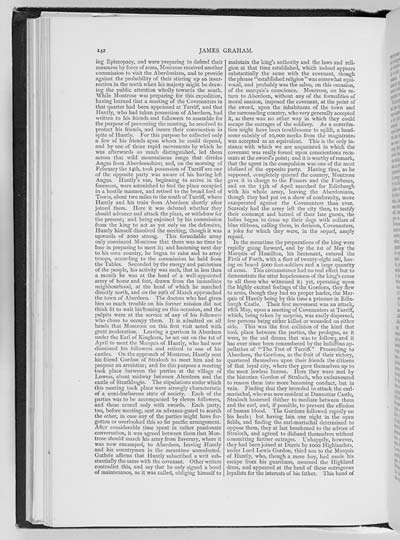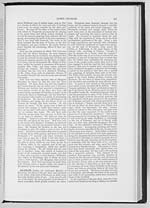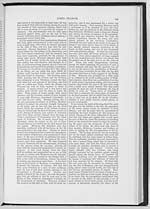142
ing Episcopacy, and were preparing to defend their
measures by force of arms, Montrose received another
commission to visit the Aberdonians, and to provide
against the probability of their stirring up an insur-
rection in the north when his majesty might be draw-
ing the public attention wholly towards the south.
While Montrose was preparing for this expedition,
having learned that a meeting of the Covenanters in
that quarter had been appointed at Turriff, and that
Huntly, who had taken possession of Aberdeen, had
written to his friends and followers to assemble for
the purpose of preventing the meeting, he resolved to
protect his friends, and insure their convocation in
spite of Huntly. For this purpose he collected only
a few of his friends upon whom he could depend,
and by one of those rapid movements by which he
was afterwards so much distinguished, led them
across that wild mountainous range that divides
Angus from Aberdeenshire; and, on the morning of
February the I4th, took possession of Turriff ere one
of the opposite party was aware of his having left
Angus. Huntly's van, beginning to arrive in the
forenoon, were astonished to find the place occupied
in a hostile manner, and retired to the broad ford of
Towie, about two miles to the south of Turriff, where
Huntly and his train from Aberdeen shortly after
joined them. Here it was debated whether they
should advance and attack the place, or withdraw for
the present; and being enjoined by his commission
from the king to act as yet only on the defensive,
Huntly himself dissolved the meeting, though it was
upwards of 2000 strong. This formidable array
only convinced Montrose that there was no time to
lose in preparing to meet it; and hastening next day
to his own country, he began to raise and to array
troops, according to the commission he held from
the Tables. Seconded by the energy and patriotism
of the people, his activity was such, that in less than
a month he was at the head of a well-appointed
army of horse and foot, drawn from the immediate
neighbourhood, at the head of which he marched
directly north, and on the 29th of March approached
the town of Aberdeen. The doctors who had given
him so much trouble on his former mission did not
think fit to wait his coming on this occasion, and the
pulpits were at the service of any of his followers
who chose to occupy them. It is admitted on all
hands that Montrose on this first visit acted with
great moderation. Leaving a garrison in Aberdeen
under the Earl of Kinghorn, he set out on the 1st of
April to meet the Marquis of Huntly, who had now
dismissed his followers and retired to one of his
castles. On the approach of Montrose, Huntly sent
his friend Gordon of Straloch to meet him and to
propose an armistice; and for this purpose a meeting
took place between the parties at the village of
Lowess, about midway between Aberdeen and the
castle of Strathbogie. The stipulations under which
this meeting took place were strongly characteristic
of a semi-barbarous state of society. Each of the
parties was to be accompanied by eleven followers,
and those armed only with swords. Each party,
too, before meeting, sent an advance-guard to search
the other, in case any of the parties might have for-
gotten or overlooked this so far pacific arrangement.
After considerable time spent in rather passionate
conversation, it was agreed between them that Mon-
trose should march his army from Inverury, where it
was now encamped, to Aberdeen, leaving Huntly
and his countrymen in the meantime unmolested.
Guthrie affirms that Huntly subscribed a writ sub-
stantially the same with the covenant. Other writers
contradict this, and say that he only signed a bond
of maintenance, as it was called, obliging himself to
maintain the king's authority and the laws and reli-
gion at that time established, which indeed appears
substantially the same with the covenant, though
the phrase "established religion" was somewhat equi-
vocal, and probably was the salvo, on this occasion,
of the marquis's conscience. Montrose, on his re-
turn to Aberdeen, without any of the formalities of
moral suasion, imposed the covenant, at the point of
the sword, upon the inhabitants of the town and
the surrounding country, who very generally accepted
it, as there was no other way in which they could
escape the outrages of the soldiery. As a contribu-
tion might have been troublesome to uplift, a hand-
some subsidy of 10,000 merks from the magistrates
was accepted as an equivalent. This is the only in-
stance with which we are acquainted in which the
covenant was really forced upon conscientious recu-
sants at the sword's point; and it is worthy of remark,
that the agent in the compulsion was one of the most
idolized of the opposite party. Having thus, as he
supposed, completely quieted the country, Montrose
gave it in charge to the Erasers and the Forbeses,
and on the 13th of April marched for Edinburgh
with his whole army, leaving the Aberdonians,
though they had put on a show of conformity, more
exasperated against the Covenanters than ever.
Scarcely had the army left the city than, to testify
their contempt and hatred of their late guests, the
ladies began to dress up their dogs with collars of
blue ribbons, calling them, in derision, Covenanters,
a joke for which they were, in the sequel, amply
repaid.
In the meantime the preparations of the king were
rapidly going forward, and by the 1st of May the
Marquis of Hamilton, his lieutenant, entered the
Firth of Forth, with a fleet of twenty-eight sail, hav-
ing on board 5000 foot-soldiers and a large quantity
of arms. This circumstance had no real effect but to
demonstrate the utter hopelessness of the king's cause
to all those who witnessed it; yet, operating upon
the highly excited feelings of the Gordons, they flew
to arms, though they had no proper leader, the Mar-
quis of Huntly being by this time a prisoner in Edin-
burgh Castle. Their first movement was an attack,
18th May, upon a meeting of Covenanters at Turriff,
which, being taken by surprise, was easily dispersed,
few persons being either killed or wounded on either
side. This was the first collision of the kind that
took place between the parties, the prologue, as it
were, to the sad drama that was to follow; and it
has ever since been remembered by the ludicrous ap-
pellation of "The Trot of Turriff." Proceeding to
Aberdeen, the Gordons, as the fruit of their victory,
quartered themselves upon their friends the Citizens
of that loyal city, where they gave themselves up to
the most lawless license. Here they were met by
the historian Gordon of Straloch, who endeavoured
to reason them into more becoming conduct, but in
vain. Finding that they intended to attack the earl-
marischal, who was now resident at Dunnottar Castle,
Straloch hastened thither to mediate between them
and the earl, and, if possible, to prevent the effusion
of human blood. The Gordons followed rapidly on
his heels; but having lain one night in the open
fields, and finding the earl-marischal determined to
oppose them, they at last hearkened to the advice of
Straloch, and agreed to disband themselves without
committing further outrages. Unhappily, however,
they had been joined at Durris by 1000 Highlanders,
under Lord Lewis Gordon, third son to the Marquis
of Huntly, who, though a mere boy, had made his
escape from his guardians, assumed the Highland
dress, and appeared at the head of these outrageous
loyalists for the interests of his father. This band of

![]() Universal Viewer |
Universal Viewer | ![]() Mirador |
Large image | Transcription
Mirador |
Large image | Transcription
![]()

